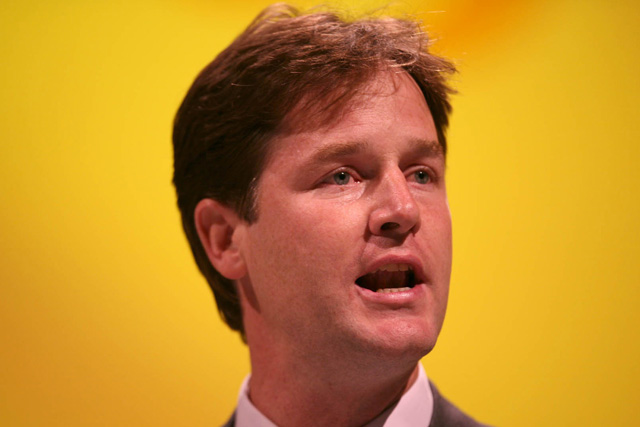
While the Liberal Democrats were not annihilated in the Oldham and Saddleworth East by-election last week, the result is still a disappointing one for the party's leader, Nick Clegg. After all, last year he had people falling over themselves to agree with him.
At the general election last May, the Lib Dems lost out to Labour by just 103 votes in 'Old and Sad', as politicos have dubbed the seat; this time around, the opposition party romped home by a margin of more than 3500 votes.
It is hard to recall any British politician who has gone from zero to hero in the public estimation, then back down to something below zero, as quickly as Nick Clegg. This time last year, he was 'Nick Who?', but in the historic TV debates, Clegg presented himself as the honest new face of politics, and 'Cleggmania' gripped the nation. However, the inconclusive election result led to the first peacetime coalition for 70 years - and there has been little for him to smile about since.
Clegg's resolve to 'be a grown-up politician' in dealing with the deficit has meant breaking some policy pledges. The tuition fees U-turn earned him the dubious distinction of having his effigy burned during riots.
We asked David Prescott, the associate director of Commucan, MBA's social media and PR company, and the son of former Labour deputy prime minister John Prescott, and Trevor Hardy, founding member of The Assembly, which handled the Lib Dems advertising account during the general election, how Brand Clegg can be restored.
DAVID PRESCOTT, associate director, Commucan
Nick Clegg's performance in the televised debates transformed the last election and, as Conservative deputy chairman, Lord Ashcroft admits, it denied David Cameron a majority.
However, after the briefest of honeymoons, the ratings of Clegg, and his party, took a beating as they seemingly became a human shield for the Tories.
Before the election Clegg had an approval rating of 72%. Now it's about -23%. There's no denying that breaking a tuition-fees promise, The Telegraph's sting and the VAT rise will keep Clegg's party polling in single figures for the time being.
Nonetheless, there is an opportunity for the deputy prime minister to draw a line under it all and win back public trust. The public and media will soon start to focus on the effects of the cuts programme with George Osborne and Cameron poised to bear the brunt of the anger. The public accepts there have to be cuts but is divided on whether the coalition is going too far, so Clegg must be seen as a brake on the worst excesses.
Remedy
- Reposition Clegg as the trusted local bank manager - aware of 'customer' problems and doing his best to help in difficult times. His 'alarm-clock Britain' description of the squeezed middle was a good start.
- Don't campaign too heavily for the alternative vote - let it be a 'people vs politicians' debate, not a referendum on Clegg.
- Get out of the Westminster village and talk to 'alarm-clock Brits'. The public will respect him for making the case.
- Don't rely on national mainstream media. Go local, hold more public meetings across the UK and bolster engagement via social media.
TREVOR HARDY, founding member, The Assembly
Nick Clegg has been quietly building his political brand for more than a decade, but all that changed quickly and dramatically last year.
This nation has never been entirely comfortable with the party leader building a brand that overshadows the party's. It's presidential and downright vulgar. However, 2010's election was the most presidential and, arguably, most-engaging, in recent memory.
What's more, separating the leader's brand from the party's is a sensitive operation. We have already witnessed inherent tensions and obvious frustrations within the Lib Dems, while party members continue to insist that all is idyllic in the house of ConDem.
One could easily see the coalition government crushing the Lib-Dem brand and catapulting that of Clegg. He has been given a platform and airtime that no previous leader of his party has been afforded. How Clegg chooses to wield that new-found power will determine whether he brings the party with him or lets it trail in the wake of Cleggmania 2.0.
Remedy
- Brands are built over years, not days; the Clegg brand should play the long game and not cater to the 24-hour news-cycle.
- Clegg should be part of the coalition, but his own man, too. He needs to have a firm, principled stand that's distinct from 'Dave'. Appealing to low-income Labour voters while the Conservatives woo business and people in the middle and higher tax brackets may be one option.
- Develop a simple, clear narrative. Clegg is extraordinarily willing to answer journalists' questions; but should spend more time presenting his key messages.

